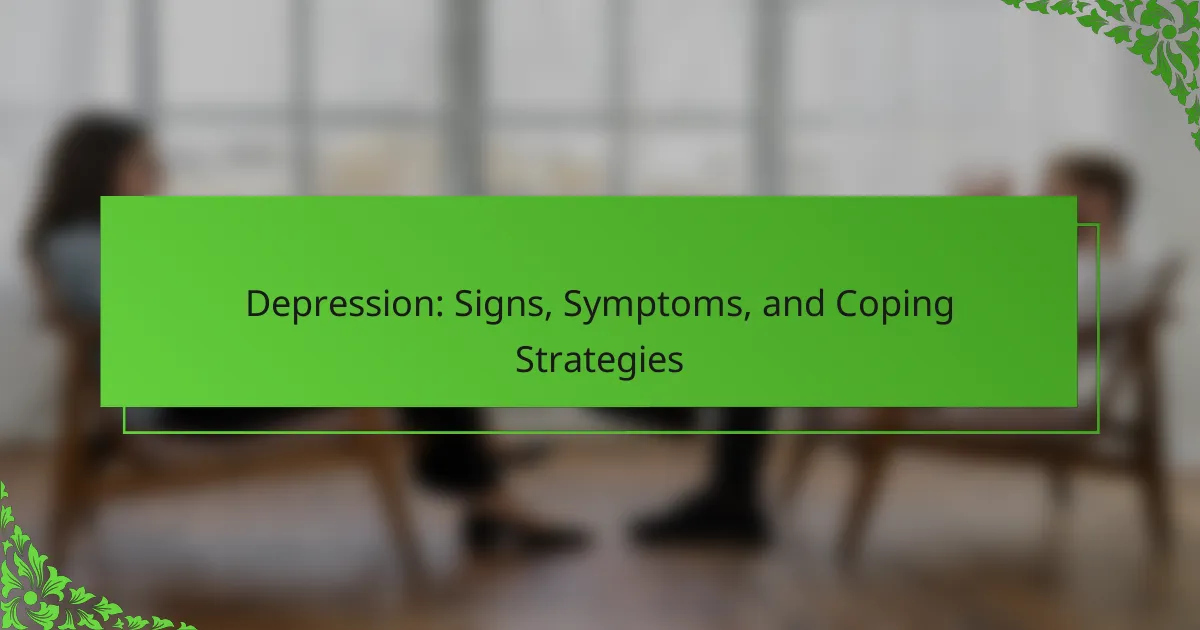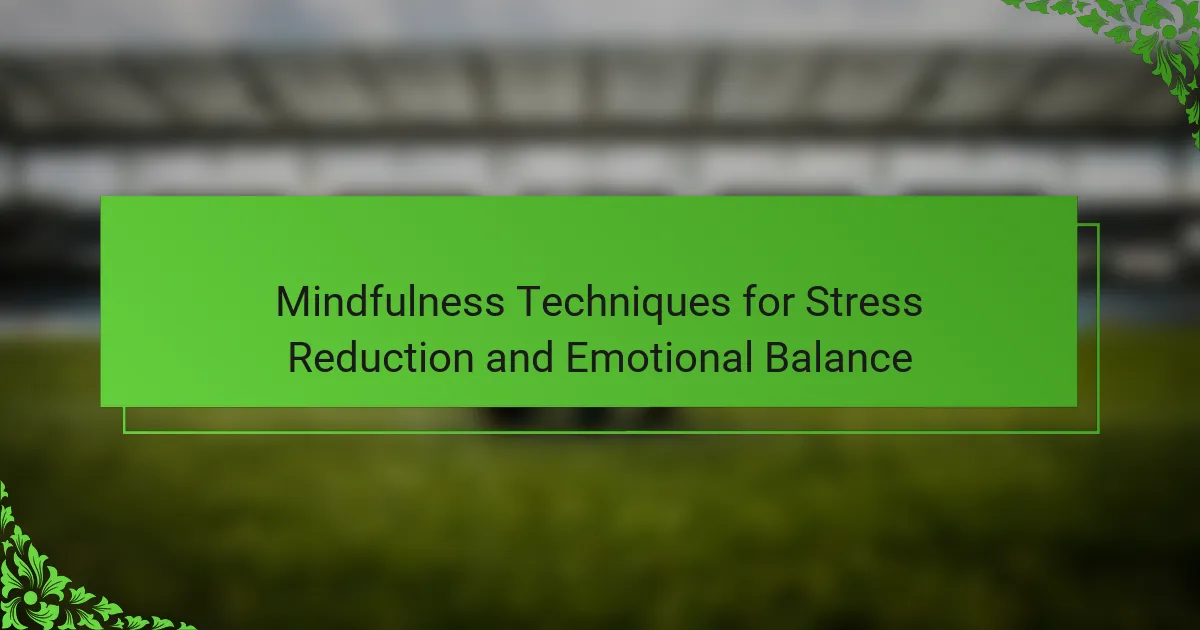Depression can significantly impact daily life, making it essential to recognize its signs and symptoms. This article explores common indicators, various types of depression, and cultural perceptions. It also discusses effective coping strategies and addresses misconceptions surrounding the condition. Finally, it highlights available resources for support and recovery.
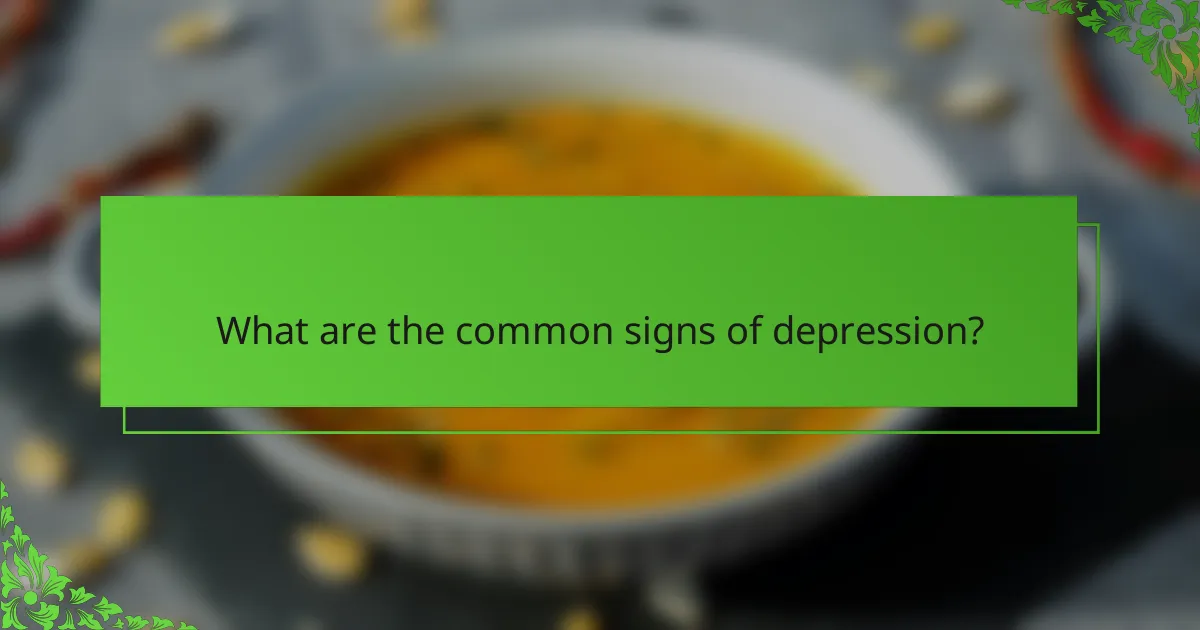
What are the common signs of depression?
Common signs of depression include persistent sadness, loss of interest in activities, changes in appetite, sleep disturbances, fatigue, difficulty concentrating, and feelings of worthlessness. These symptoms can vary in intensity and duration, affecting daily functioning. Recognizing these signs is crucial for seeking help and implementing coping strategies.
How do emotional symptoms manifest in individuals?
Emotional symptoms in individuals with depression often manifest as persistent sadness, irritability, and feelings of hopelessness. These symptoms can lead to social withdrawal and a decreased interest in previously enjoyed activities. Individuals may experience difficulty concentrating, fatigue, and changes in sleep patterns. As a result, emotional symptoms significantly impact daily functioning and overall well-being.
What physical symptoms are associated with depression?
Physical symptoms associated with depression include fatigue, sleep disturbances, changes in appetite, and unexplained aches. These manifestations often reflect the body’s response to emotional distress. For example, fatigue may stem from disrupted sleep patterns, while changes in appetite can lead to weight fluctuations. Many individuals experience muscle pain or headaches, which can be unique to their depression experience. Understanding these symptoms aids in recognizing and addressing depression effectively.
Which behavioral changes indicate depression?
Behavioral changes indicating depression include withdrawal from social activities, decreased interest in hobbies, and changes in sleep patterns. These signs often manifest as irritability, fatigue, and difficulty concentrating. Individuals may also exhibit changes in appetite, leading to weight loss or gain. Recognizing these changes is crucial for timely intervention and support.
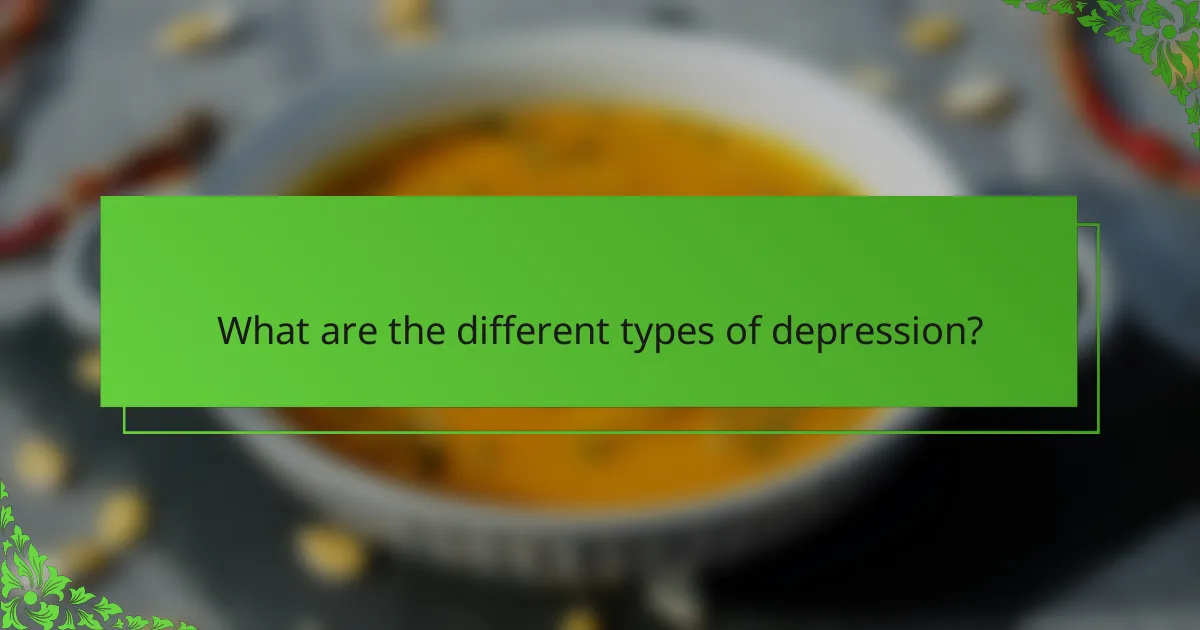
What are the different types of depression?
Depression encompasses various types, each with distinct characteristics. Major depressive disorder, persistent depressive disorder, bipolar disorder, seasonal affective disorder, and atypical depression are common types. Each type presents unique signs and symptoms, requiring tailored coping strategies.
How does major depressive disorder differ from other forms?
Major depressive disorder (MDD) is characterized by persistent low mood and loss of interest, differing from other forms of depression in severity and duration. MDD typically lasts for at least two weeks, while other forms, such as situational depression, may arise from specific stressors and resolve more quickly. Additionally, MDD often presents with more severe symptoms, including significant impairments in daily functioning. Understanding these distinctions is crucial for effective treatment and support strategies.
What defines persistent depressive disorder?
Persistent depressive disorder, also known as dysthymia, is characterized by a chronic low mood lasting for at least two years. Individuals often experience symptoms such as fatigue, low self-esteem, and difficulty concentrating. This condition can significantly impact daily functioning and quality of life. Treatment typically involves therapy and, in some cases, medication to manage symptoms effectively.
Which unique characteristics are found in bipolar disorder?
Bipolar disorder is characterized by extreme mood swings, including manic and depressive episodes. Unique traits include rapid cycling between moods, heightened energy levels during mania, and significant changes in sleep patterns. These fluctuations can disrupt daily functioning and relationships. Additionally, individuals may experience psychotic symptoms during severe episodes, distinguishing bipolar disorder from unipolar depression.
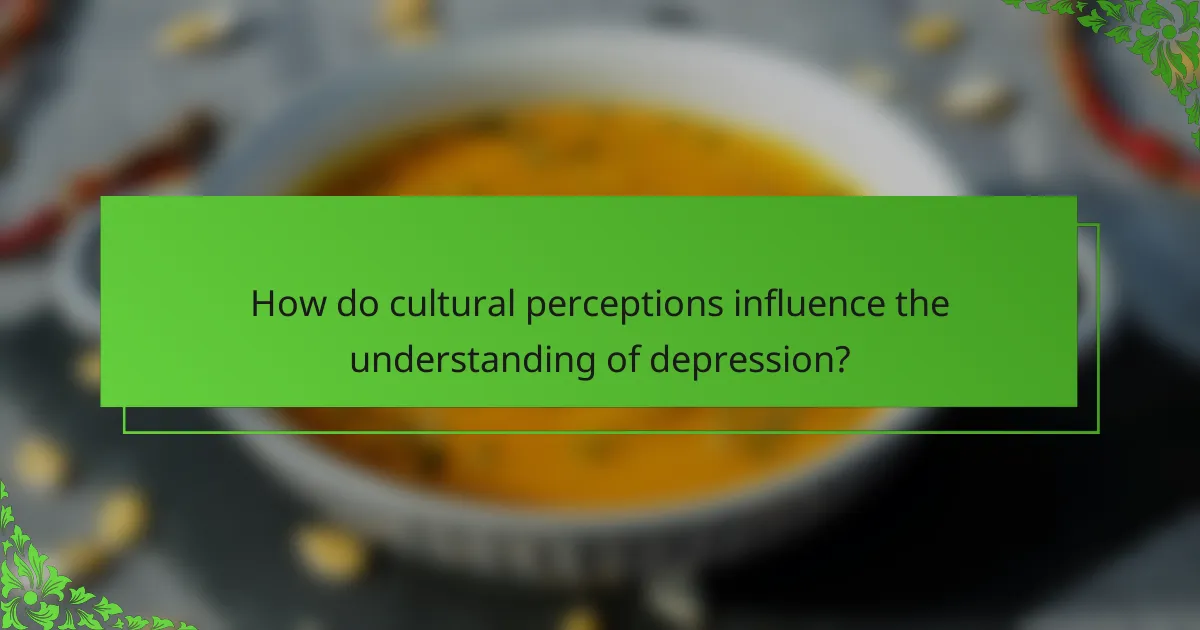
How do cultural perceptions influence the understanding of depression?
Cultural perceptions significantly shape the understanding of depression. Different societies interpret signs and symptoms uniquely, affecting stigma and treatment approaches.
In collectivist cultures, depression may be viewed as a weakness, leading individuals to hide their struggles. In contrast, individualistic societies often encourage open discussions about mental health, promoting acceptance and treatment.
Research indicates that cultural beliefs influence coping strategies. For instance, some cultures may prioritize community support, while others emphasize personal resilience. This diversity in understanding impacts the effectiveness of interventions and support systems globally.
Addressing these cultural nuances is crucial for developing effective mental health resources and reducing stigma associated with depression.
What role does stigma play in seeking help?
Stigma significantly hinders individuals from seeking help for depression. Fear of judgment and misunderstanding often discourages open discussions about mental health. This stigma can lead to feelings of isolation, worsening symptoms, and reluctance to access necessary support services. Studies indicate that individuals who perceive high stigma are less likely to pursue treatment, contributing to prolonged suffering and decreased quality of life. Addressing stigma through education and awareness can encourage more people to seek help and improve mental health outcomes.
How do regional differences affect treatment approaches?
Regional differences significantly influence treatment approaches for depression. Cultural beliefs, healthcare availability, and local practices shape how individuals perceive and address mental health.
For instance, in some regions, traditional healing methods are preferred over clinical interventions, impacting access to therapy and medication. In contrast, urban areas may offer more resources, leading to diverse treatment options.
Moreover, stigma surrounding mental health varies by region, affecting individuals’ willingness to seek help. As a result, tailored strategies that consider local contexts are crucial for effective treatment.
Understanding these regional nuances helps mental health professionals provide culturally competent care that resonates with patients’ experiences and needs.
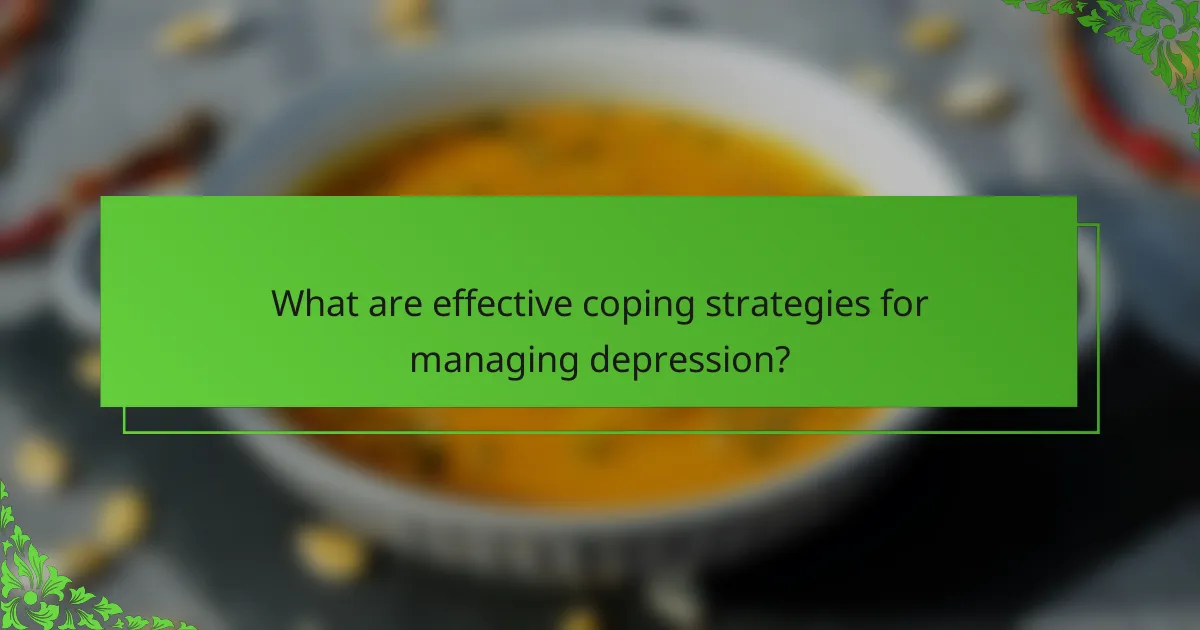
What are effective coping strategies for managing depression?
Effective coping strategies for managing depression include therapy, medication, lifestyle changes, and support systems. Engaging in cognitive behavioral therapy can help reframe negative thought patterns. Antidepressants may stabilize mood by balancing brain chemicals. Regular exercise boosts endorphins, enhancing overall well-being. Building a support network provides emotional relief and encouragement. Mindfulness practices, like meditation, reduce stress and improve emotional regulation.
How can lifestyle changes contribute to better mental health?
Lifestyle changes can significantly improve mental health by reducing symptoms of depression. Regular exercise, a balanced diet, and adequate sleep enhance mood and cognitive function.
Engaging in physical activities releases endorphins, which are natural mood lifters. A nutritious diet rich in omega-3 fatty acids and antioxidants supports brain health. Prioritizing sleep restores energy and improves emotional regulation.
Mindfulness practices, such as meditation and yoga, reduce stress and promote emotional resilience. Social connections also play a vital role; strong support networks provide encouragement and decrease feelings of isolation.
Implementing these lifestyle changes can lead to long-term benefits, fostering a more positive outlook and better overall mental well-being.
Which therapeutic approaches are most beneficial?
Cognitive Behavioral Therapy (CBT), mindfulness-based therapy, and interpersonal therapy are among the most beneficial approaches for treating depression. These methods focus on changing negative thought patterns, enhancing emotional regulation, and improving interpersonal relationships. Research indicates that CBT can significantly reduce symptoms in up to 60% of patients. Mindfulness practices help individuals develop awareness, leading to reduced rumination and improved mood. Interpersonal therapy emphasizes the role of social relationships, addressing issues that may contribute to depressive symptoms.
What role does medication play in treatment?
Medication plays a significant role in treating depression by alleviating symptoms and improving overall mental health. Antidepressants can help balance chemicals in the brain associated with mood regulation. Common classes include selective serotonin reuptake inhibitors (SSRIs) and serotonin-norepinephrine reuptake inhibitors (SNRIs). These medications typically take several weeks to show effects, and their effectiveness varies among individuals. Combining medication with therapy enhances treatment outcomes, addressing both biological and psychological aspects of depression. Regular consultations with healthcare providers ensure appropriate management and adjustments to medication as needed.

How can support systems aid in recovery?
Support systems significantly enhance recovery from depression by providing emotional, social, and practical assistance. They foster connection, reducing feelings of isolation. Support can come from friends, family, or support groups, offering a safe space for sharing experiences. Studies show that individuals with strong support networks tend to have better mental health outcomes. Engaging with others can also encourage positive coping strategies, promoting resilience and hope during challenging times.
What is the importance of social connections?
Social connections play a crucial role in mitigating depression. Strong relationships provide emotional support, enhance feelings of belonging, and reduce feelings of isolation. Research shows that individuals with robust social networks experience lower rates of depression and anxiety. Engaging with others can lead to increased happiness and improved mental health outcomes.
How can family and friends provide effective support?
Family and friends can provide effective support by being present, listening actively, and encouraging professional help. They should validate feelings without judgment and offer practical assistance, such as helping with daily tasks. Understanding depression’s signs and symptoms helps them respond appropriately. Regular check-ins can foster connection and remind individuals they are not alone.
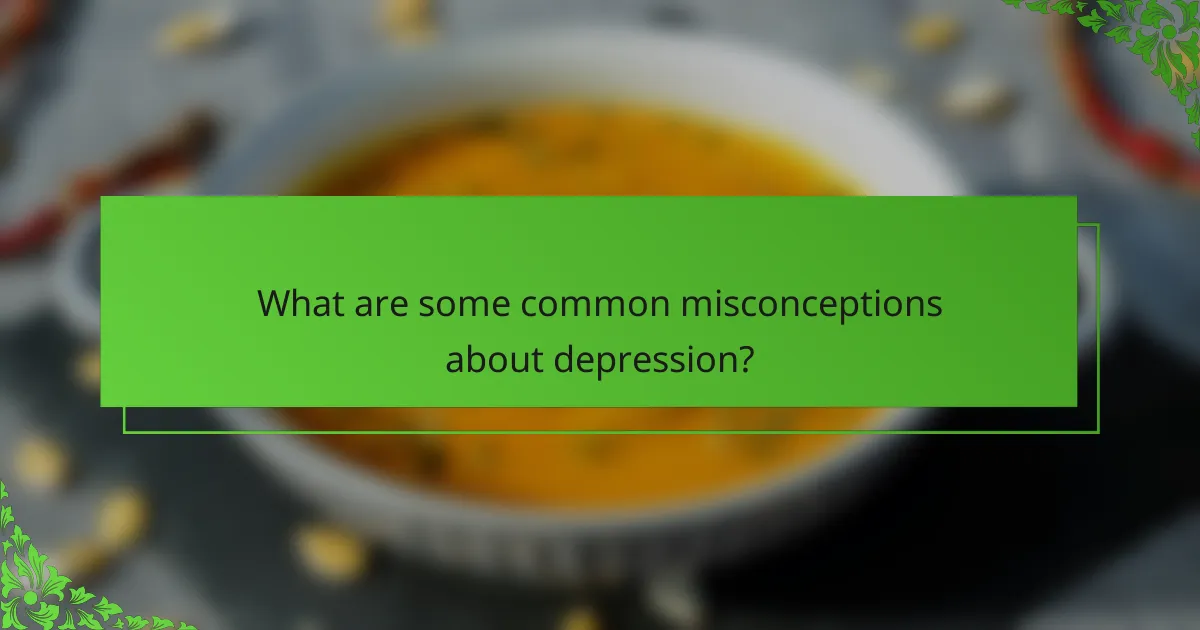
What are some common misconceptions about depression?
Many misconceptions about depression exist, including the belief that it is just sadness or a weakness. Depression is a complex mental health condition that can affect anyone, regardless of their circumstances. One common myth is that people with depression can simply “snap out of it.” This misunderstanding undermines the serious nature of the illness and the need for appropriate treatment.
Another misconception is that depression only affects adults. In reality, children and adolescents can also experience depression, often showing different signs and symptoms. Additionally, some believe that antidepressants are the only solution. While medication can be effective, therapy and lifestyle changes are also crucial components of a comprehensive treatment plan.
Moreover, there’s a notion that depression is always triggered by a specific event. While life events can contribute, depression may also arise without a clear cause. Lastly, some think that individuals with depression are always visibly upset. Many people mask their symptoms, leading to the false perception that they are fine. Understanding these misconceptions is vital for fostering empathy and encouraging those affected to seek help.
How does the portrayal of depression in media impact public perception?
The portrayal of depression in media significantly shapes public perception by influencing attitudes and understanding. Accurate representations can foster empathy and awareness, while stigmatizing portrayals may exacerbate misconceptions. Research indicates that media can either normalize discussions about mental health or reinforce harmful stereotypes, affecting how individuals seek help. For example, positive depictions can encourage open conversations, while negative ones can lead to avoidance and shame. Thus, media plays a critical role in shaping societal views on depression and mental health.
What myths about treatment hinder recovery?
Myths about treatment can significantly hinder recovery from depression. Common misconceptions include the belief that therapy is only for severe cases, that medication is a quick fix, and that individuals should be able to overcome depression on their own. These myths can lead to stigma, discourage seeking help, and delay effective treatment. Understanding the realities of depression treatment, such as the need for a combination of therapy and medication, is crucial for recovery.
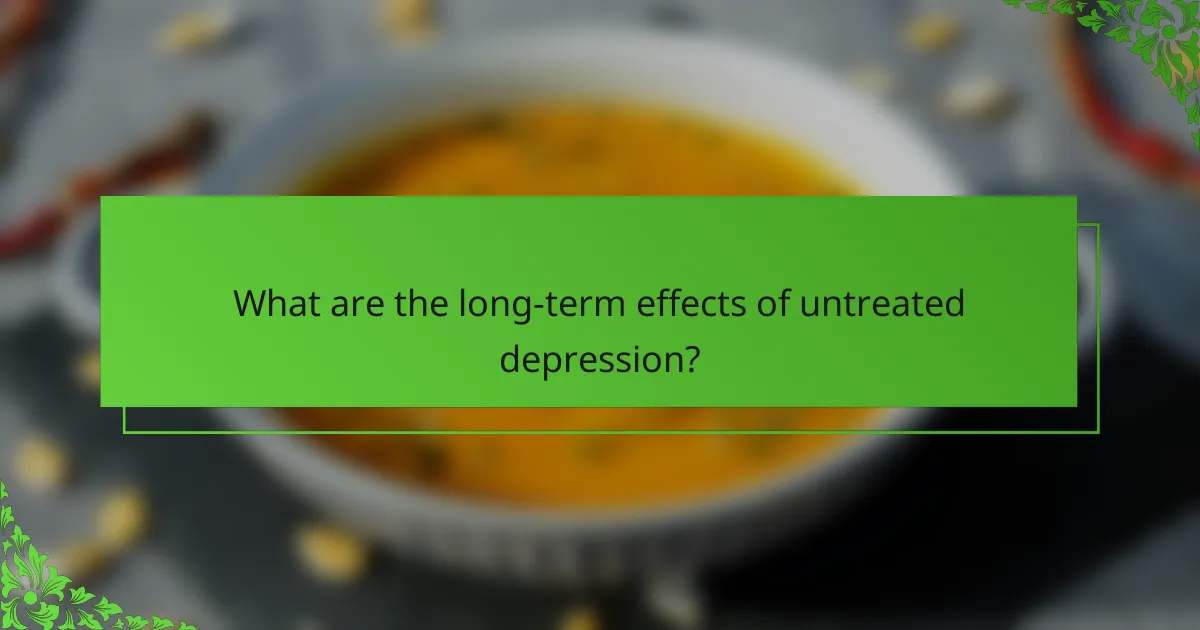
What are the long-term effects of untreated depression?
Untreated depression can lead to severe long-term effects, including chronic health issues, impaired functioning, and diminished quality of life. Individuals may experience persistent emotional distress, increased risk of substance abuse, and strained relationships. As a result, untreated depression can contribute to significant physical health problems, such as cardiovascular disease and weakened immune response. Long-term effects often include cognitive decline and increased susceptibility to other mental health disorders.
How does depression affect physical health over time?
Depression negatively impacts physical health over time by contributing to various chronic conditions. It can lead to cardiovascular disease, obesity, and weakened immune function. Research indicates that individuals with depression are more likely to experience fatigue, sleep disturbances, and gastrointestinal issues. As a result, the overall quality of life diminishes, increasing healthcare costs and reducing productivity.
What impact does depression have on relationships?
Depression significantly strains relationships, often leading to communication breakdowns and emotional distance. Individuals may withdraw, experience irritability, or struggle to express feelings, causing partners to feel neglected or frustrated. This cycle can create misunderstandings and exacerbate feelings of isolation. As a result, addressing depression through effective coping strategies is crucial for maintaining healthy relationships.
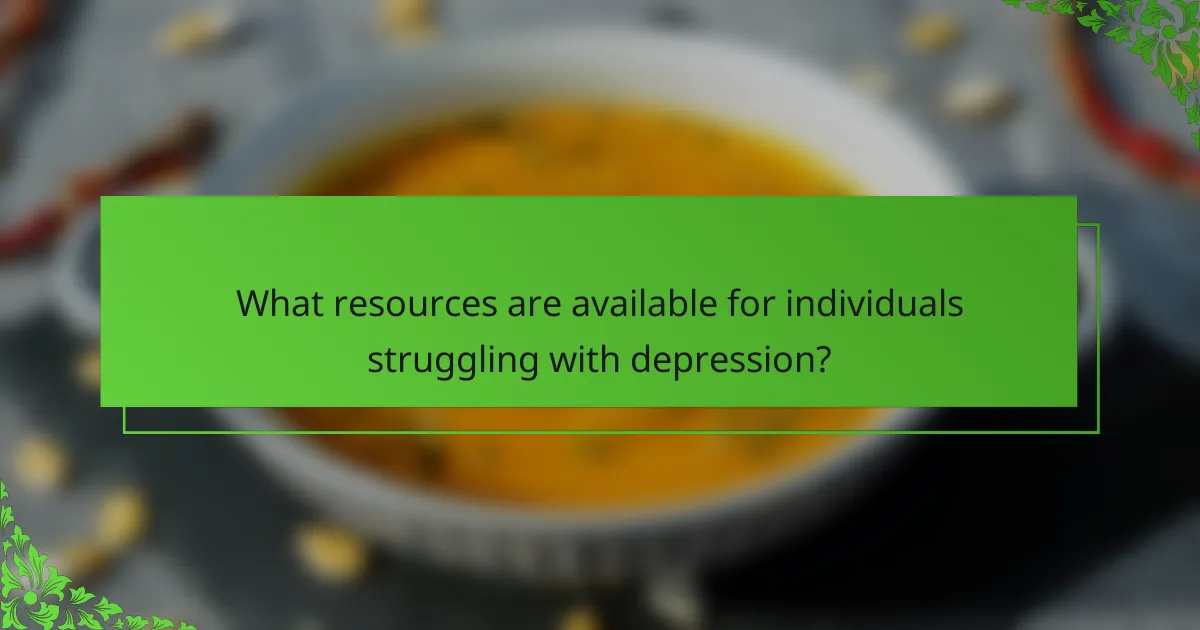
What resources are available for individuals struggling with depression?
Individuals struggling with depression can access various resources for support. These include mental health professionals, support groups, hotlines, and online therapy platforms.
1. Mental health professionals: Psychiatrists and psychologists provide therapy and medication management.
2. Support groups: Local or online groups offer community and shared experiences.
3. Hotlines: Crisis hotlines provide immediate support and guidance.
4. Online therapy platforms: Services like BetterHelp connect users with licensed therapists remotely.
Each resource offers unique attributes, such as accessibility and anonymity, catering to different needs.
How can one find professional help effectively?
To find professional help effectively, identify your specific needs and explore various resources. Start by consulting a primary care physician for referrals or searching online directories for mental health professionals. Consider therapists who specialize in depression, as they understand the unique challenges associated with it. Additionally, utilize support groups or helplines for immediate assistance. Research credentials and reviews to ensure quality care.
What online communities and support groups exist?
Numerous online communities and support groups exist for individuals dealing with depression. These platforms provide resources, shared experiences, and emotional support.
Popular options include:
– **Reddit**: Subreddits like r/depression and r/mentalhealth offer peer support and discussions.
– **Facebook Groups**: Various groups focus on depression support, allowing users to share stories and coping strategies.
– **7 Cups**: An online platform providing free emotional support through chat and community forums.
– **Mental Health America**: Offers online support groups and resources for individuals seeking help.
– **NAMI**: The National Alliance on Mental Illness provides virtual support groups and educational resources.
These communities foster connection and understanding, helping individuals navigate their experiences with depression.
What practical tips can enhance coping strategies?
Practical tips to enhance coping strategies for depression include establishing a routine, engaging in physical activity, practicing mindfulness, and seeking social support. These methods can improve emotional resilience and overall well-being.
1. Establish a daily routine to create structure and predictability.
2. Engage in regular physical activity to boost endorphin levels.
3. Practice mindfulness or meditation to reduce stress and increase awareness.
4. Seek social support from friends, family, or support groups.
5. Maintain a balanced diet to support mental health.
6. Set realistic goals to foster a sense of achievement.
